
With the multitude of choices available on the market today, how do you choose an effective CBD product for your needs? How do you decide what CBD product is the best for you?
There are many ways to take CBD. Which method of consumption you choose is largely down to personal preference but the bioavailability (absorption rate) varies with each method. But the effectiveness of a CBD product is not just down to the way you take CBD. In fact, arguably the most important aspect when choosing a CBD product for your needs, is the cannabinoid profile. Each cannabinoid has its own individual therapeutic benefits. So buying a CBD oil based on its cannabinoid profile could mean a more effective CBD product for your individual needs.
Think of CBD oil like a multivitamin. Each cannabinoid is like a separate vitamin or mineral. When taking multivitamins you tailor the product to your needs e.g. women of menstruating age may buy a vitamin supplement with higher levels of iron. While someone looking to improve their bone health may take a product with added calcium and vitamin D.
It’s the same with cannabinoids in CBD products. To get the most out of a CBD oil, you choose the cannabinoid profile based on your health conditions and your specific needs.
Now you may be asking; what does “cannabinoid profile” mean? Or how do I find out what the cannabinoid profile of a certain CBD product is? or what cannabinoids should I be looking for? Let’s start by explaining what cannabinoids are.
What are cannabinoids?
The cannabis plant produces as many as 113 different cannabinoids. Among these cannabinoids, THC and CBD are the most prevalent and the most well understood. Each cannabinoid has its own specific therapeutic properties.
Cannabinoids are a diverse class of chemical compounds that occur naturally in the human body and also in some plants, most notably, cannabis. These cannabinoids interact with receptors within our bodies own endocannabinoid system (ECS) to trigger various physiological actions. The ECS plays a essential role within the body and cannabinoids are vital for the ECS to function effectively.
How CBD and other cannabinoids work
Before going any further I will briefly recap on how CBD and other cannabinoids work within the body.
CBD and other cannabinoids in CBD products, interact with the body’s native endocannabinoid system (ECS) . This system, found in all mammals, is tasked with regulating a wide array of the body’s functions like mood, appetite, sleep, hormone production, and even pain and immune system responses. The endocannabinoid system is regularly adjusting these functions in an effort to keep them in balance.
A properly functioning endocannabinoid system (ECS) is crucial for our health and well-being. It serves the vital purpose of ensuring our cells maintain optimum performance. CBD helps our endocannabinoid system make adjustments to bring our bodies back into balance, or homeostasis.
For a more detailed look at how CBD works within the body and the endocannabinoid system, please click here.
Common benefits of cannabinoids
Now let’s move on to the therapeutic benefits of cannabinoids.
While the specific benefits vary from one cannabinoid to the next, many common benefits are found in many types of these compounds. Some of the primary benefits of cannabinoids include:
- Pain relief
- Anti inflammatory
- Antibacterial
- Appetite stimulant
- Sedative
- Nerve and brain cell protection
- Antitumor effects
- Antispasmodic
- Antioxidant
- Reduce intraocular pressure
- Antidepressant
The main cannabinoids and their therapeutic effects
Cannabinoids and their effects are becoming increasingly well known. Although not all of the compounds in the cannabinoid plant have been identified, thanks to recent research we have been able to find out how some of them work and how they are able to benefit well-being.
The following is a list of the most prevalent cannabinoids found it cannabis, along with their therapeutic properties.
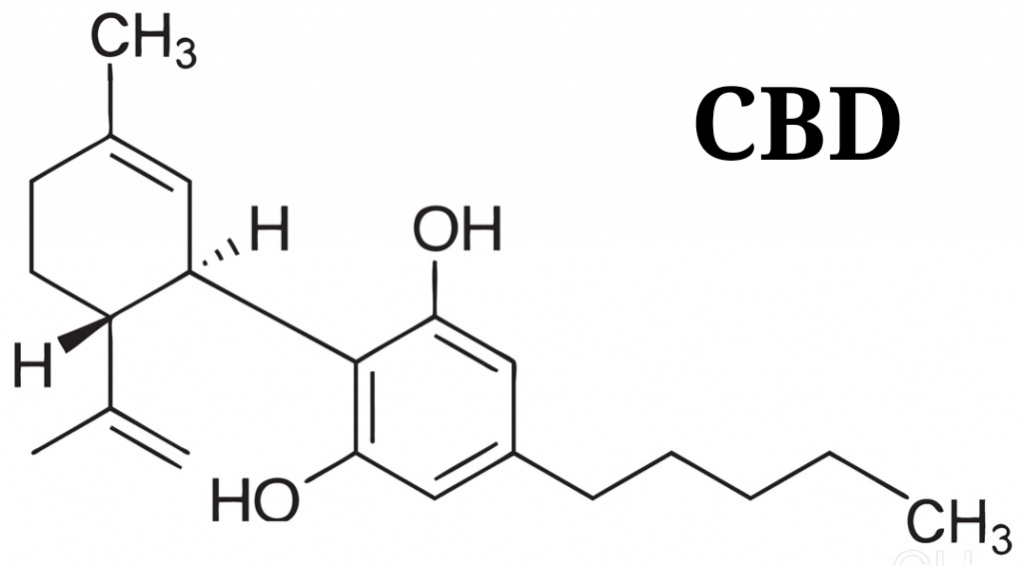
CBD (Cannabidiol)
CBD is one of the most abundant cannabinoids found in cannabis and it’s received a lot of attention over the past few years. But it wasn’t until fairly recently that it was recognised for its beneficial therapeutic properties.
Unlike it’s more famous cousin THC, CBD is non-intoxicating, so it won’t get you high. This is because, unlike THC, CBD doesn’t bind to CB1 receptors in the brain. Infact CBD has actually been shown to reduce the unwanted side effects associated with THC.
The list of known benefits of CBD is steadily increasing due to the amount of studies currently being carried out. Research has shown that it can help diseases such as epilepsy, depression, anxiety, mental illness, chronic pain and diabetes as well as many other illnesses.
Potential benefits of CBD include:
- Anti-inflammatory properties
- Neuron protection against injury and degeneration
- Mood improvement
- Pain relief
- Antipsychotic characteristics
- Migraine relief
- Antibacterial properties
- Promotes bone growth
- Reduces seizures
- Reduces blood sugar
- Reduces vomiting and nausea
- Relieves anxiety
- Inhibits cancer cell growth
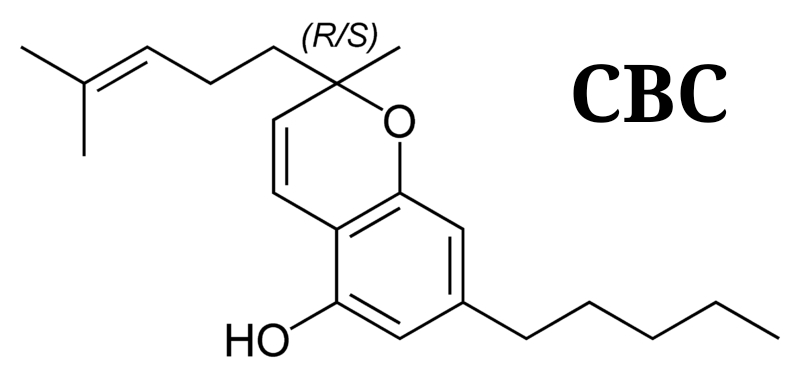
CBC (Cannabicromene)
CBC does not possess any psychoactive effects and above all it has huge anti-inflammatory potential.
Research has shown that CBC is an effective painkiller. It also has antibacterial and antifungal properties, as well as possible antidepressant effects.
CBC has been found to have potentially therapeutic effects in treating acne. It may also be useful for treating diarrhoea.
Potential benefits of CBC include:
- Anti-inflammatory
- Anti-tumor effects
- Antidepressant
- Mild anti-fungal effects
- Antibacterial effects
- Potentially encourages the growth of new brain cells by increasing viability as brain cells develop
- Pain relief, although not as significant as some other cannabinoids
- Promotes bone growth
- Inhibits cancer cell growth
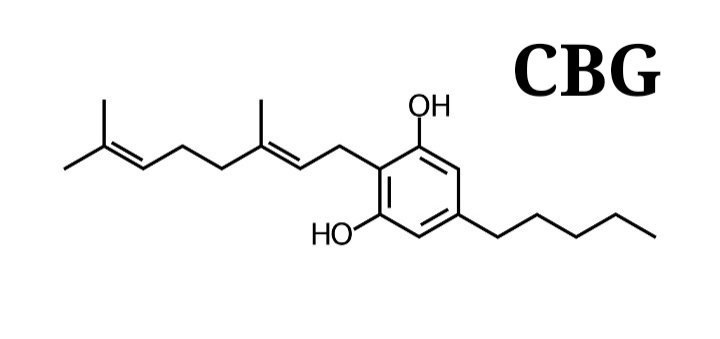
CBG (Cannabigerol)
CBG is a cannabinoid that is found in low concentrations, since it can only be found at the beginning of the plant cycle, especially in the hemp plant.
This cannabinoid has been found to have many therapeutic effects, including pain relief, antifungal and antibacterial effects, reduced inflammation, and neuroprotective effects.
Potential benefits of CBG include:
- Relief for glaucoma patients due to reduction in intraocular pressure
- Antibiotic effects
- Potential therapeutic effects for psoriasis and similar skin conditions
- Pain relief
- Antidepressant
- Mood regulation
- Antioxidant effects
- Anti-inflammatory effects
- Aids sleep
- Relieves anxiety
- Muscle relaxant
- Promotes bone growth
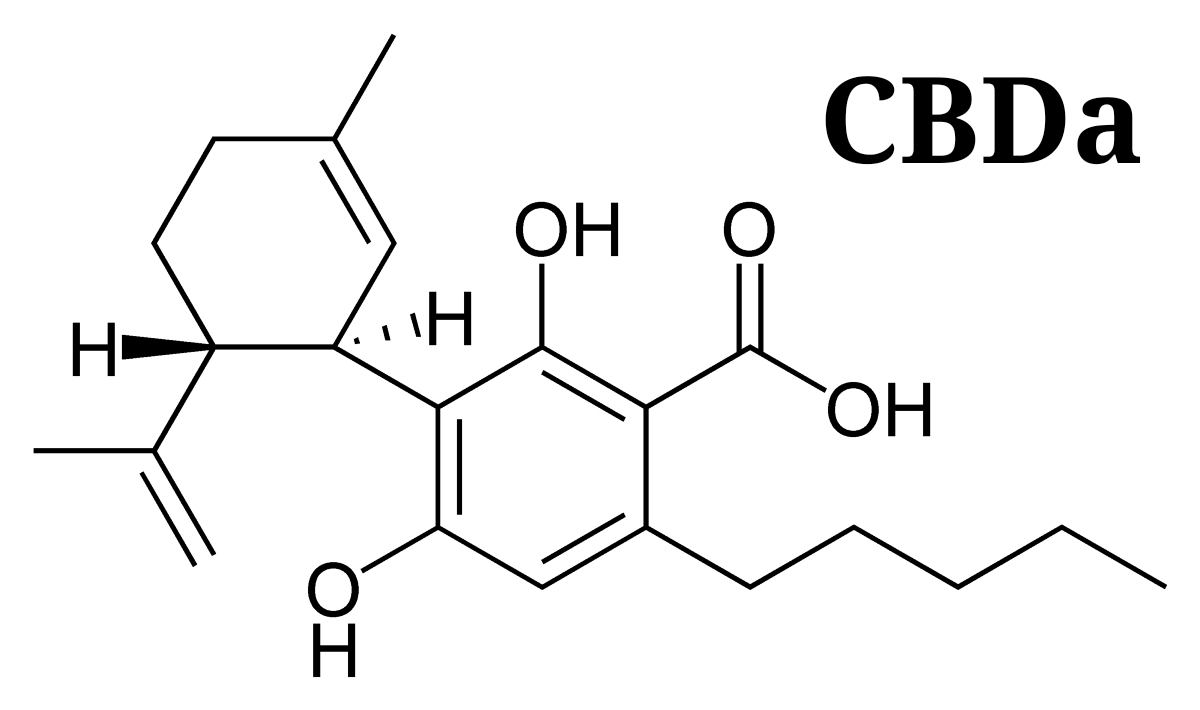
CBDa (Cannabidiolic acid)
CBDa is often referred to as “the raw cannabinoid that fights inflammation”. CBDa is the acidic parent of CBD found in the raw plant.
CBDa is a chemical compound found in the resin glands (trichomes) of raw cannabis plants. In this case, raw means unheated and uncured. CBDa converts to CBD when it is exposed to heat, sunlight, or time. CBDa is non-psychoactive.
Potential benefits of CBDa include:
- Anti-inflammatory
- Anti-nausea
- Antioxidant
- Painkiller
- Anti-cancer
- Antibacterial/antimicrobial
- Anti-anxiety
“Controlled” Cannabinoids
The above cannabinoids are found in varying degrees in most high quality full spectrum CBD oils. While THC and CBN have many therapeutic properties, they remain controlled substances in the UK and in many countries around the world. Therefore, they will only appear in trace amounts in legal CBD oils. But this article would be incomplete if I did not discuss them.
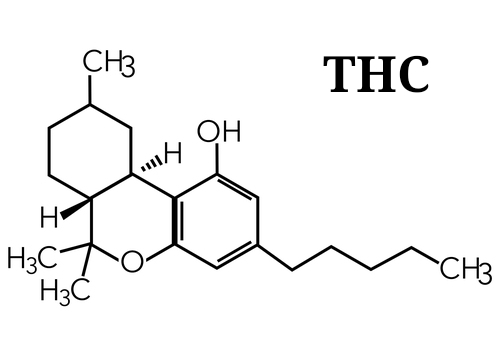
THC (Tetrahydrocannabinol)
Although THC is known for its psychoactive effects it also has many potential therapeutic properties. Currently studies of the interaction between THC and cancer cells are being analysed and it has been found that cannabinoids have anti-tumour effects.
THC acts as a partial agonist at the CB1 and CB2 receptors. The compound is a mild analgesic, or painkiller, and cellular research has shown that it has antioxidant activity.
Potential benefits of THC include:
- Relaxation
- Pain relief
- Appetite stimulant
- Potential medicinal benefits for Alzheimer’s disease, multiple sclerosis, Parkinson’s disease, PTSD, cancer and Crohn’s disease
- Anti-inflammatory properties
- Prevents nerve damage
- Antispasmodic effects to minimize spasms or convulsions, such as those in epilepsy
- Helps minimize vomiting and nausea, making it useful for cancer patients undergoing chemotherapy
- Antioxidant effect

CBN (Cannabinol)
CBN is a degraded form of THC. It is responsible for most of the sedative effects exhibited by the plant. In fact, one of the therapeutic benefits of CBN is its ability to induce sleep. Apart from its usefulness for treating insomnia, it has also been known to be used as an anticonvulsant.
Research has indicated that CBN may have antibacterial properties, anticonvulsant effects, and the ability to increase appetite. It can also help relieve pain, and has a sedative effect.
Potential benefits of CBN include:
- Sedating properties
- Appetite stimulant
- Effectiveness against antibiotic-resistant strains of MRSA infections
- Pain relief
- Anti-inflammatory
- Helps relieve spasms and convulsions
- Support of bone cell growth
- Antioxidant
- Reduces intraocular pressure to benefit glaucoma patients
- Muscle relaxant
I have covered some of the main cannabinoids along with their therapeutic effects. It’s hoped that in the next few years, thanks to the advancement of scientific studies, more health benefits of the cannabis plant will be discovered.
How do you know what cannabinoids are in each CBD product?
You now know what cannabinoids to look for to maximise the benefits you receive for you specific health situation, but how do you find a CBD product to suit your needs?
High quality CBD products made from “whole plant” will contain a range of cannabinoids (and terpenes too, but I will discuss those in a future post) but if you want to know the exact levels of different cannabinoids you will need to request a lab report.
All reputable CBD companies will be happy to provide a lab report and also answer any questions you might have about their products. Lab reports will contain a breakdown of the cannabinoid profile and some will also contain other information like the terpene profile and contaminant details.
If CBDa is the cannabinoid you are most interested in you will need to buy a “raw” CBD oil or paste. These products are normally advertised as “raw” or high in CBDa or they are sometimes referred to as CBD/CBDa oils. CBDa occurs naturally in the cannabis plant in its raw form, CBD, on the other hand does not. But when CBDa is heated or processed it is converted into CBD. This is why a raw product is needed.
Tailor the cannabinoid profile to meet your needs
Your goal should be to tailor your cannabinoid therapy to the conditions and symptoms you want to treat. In this article I have discussed the main cannabinoids and their therapeutic properties. Armed with this knowledge you can choose a CBD product to maximise the benefits you receive.
But cannabis-based supplements are a very personal treatment, with every person requiring a different composition for even the same condition. As a result, there is often much trial and error that goes into finding your ideal cannabinoid content.
I personally need a CBD product that also contains CBG to tackle my fibromyalgia pain, anxiety, depression and insomnia. CBG has probably had a bigger positive impact on my health than CBD. But what works for me may not work for you.
Please don’t feel disheartened if you don’t notice benefits straight away. It can take time to find the right CBD product for your specific needs. Experiment with CBD products with different cannabinoid profiles. I know this may seem like hard work but the potential benefits to your health are worth the effort.
If you would like a bit of motivation before starting your CBD journey please read this post. It includes comments from regular CBD users about the positive impact CBD has had on their health.
If you would like to find out more about CBD, or you have any specific questions you need answering, please head over to my Facebook page CBD Resource Centre
For more personal stories, reviews, news, inspirational quotes and in-depth discussion, please head over to my Facebook page.

My husband would like to try and but we are unsure where to start. He has osteoarthritis and does not like painkillers because they constipate him. He also has diverticulitis. He also has sleep disorders and takes 8 tablets per night for this all Parkinson’s meds as it’s really all they can offer for his restless leg and periodic limb disorder. Any advice would be appreciated.
Hi Karen. Your husband may benefit from a CBD oil with higher levels of CBDa. CBDa is another cannabinoid like CBD and it’s a good anti inflammatory.
This is a good oil to start with and it has higher levels of CBDa. https://www.simply-cbd.co.uk/product/simplycbd-green-10ml-30ml/
With regards to his insomnia, I take this product about 30 minutes before bed and it definitely helps. It contains added relaxing terpenes which help with sleep.
http://www.molytor.co.uk/product/molytor-nights-access-cbd-oil/
I would also recommend reading this article. It has a small section about CBD Dosing.
https://www.ajourneythroughthefog.co.uk/2018/11/7-potential-side-effects-of-cbd-and-tips-on-how-to-minimise-them/
Which oil would you suggest for pudendal neuralgia, a type of pelvic pain and spasm in the eurethra. This occurred following a fall on the buttocks 3 years ago which has caused damage or irritation of the pudendal nerve.
Hi Martin. Unfortunately this isn’t a condition which I have any experience treating. I personally suffer from fibromyalgia and I find the hybrid CBD oil from a company called Molytor effective for my pain.
However, if you would like to see if you can get advice from people with the same condition as yours, this Facebook CBD support group has over 50k members so someone may be able to help.
https://www.facebook.com/groups/CBDusersUK/
Hi,
Thank you for a very helpful article. I need help with insomnia, so ( I think) I need a CBN product?, could you recommend one please?
Hi Sue. Unfortunately, as CBN is a degraded form of THC, it’s a controlled substance in the UK and therefore illegal. You could try a cbd oil with added relaxing terpenes or one with added CBG. I find both these types of products effective for my insomnia.